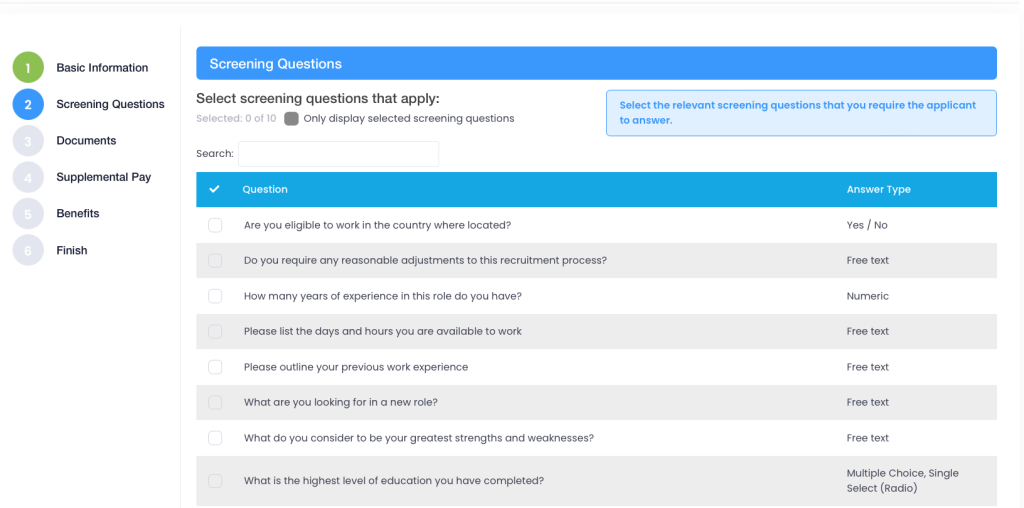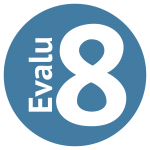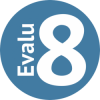The ability to conduct effective interviews is a pivotal skill. Exceptional interviews allow you to uncover the true potential of candidates, ensuring the right fit for your organisation and contributing to long-term success.
This comprehensive guide is specifically designed for HRand business managers, providing you with the knowledge and strategies needed to excel in the art of interviewing. By mastering these techniques, you’ll be well-equipped to make informed hiring decisions, foster a positive candidate experience, and elevate your organisation’s talent acquisition process.
Crafting the Perfect Interview Structure
Setting the Stage
To conduct exceptional interviews, it’s crucial to create an atmosphere of comfort and trust. Choose a quiet, private location with minimal distractions. Begin the conversation by introducing yourself, outlining the purpose of the interview, and expressing gratitude for the interviewee’s participation. This initial rapport-building will put your interviewee at ease and lay the foundation for a successful interview.
Developing a Question Line-up
Outstanding interviews require thoughtful, well-structured questions. Follow these guidelines to create a compelling question line-up:
1. Start with open-ended questions: Encourage interviewees to share their thoughts, feelings, and experiences in detail.
2. Use probing questions: Delve deeper into the conversation by asking for specific examples, elaborations, or clarifications.
3. Avoid leading questions: Ensure objectivity by steering clear of questions that could bias the interviewee’s response.
4. Maintain balance: Include a mix of easy, moderately challenging, and difficult questions to keep the conversation flowing and engaging.
Allocate ample time for each interview question and avoid rushing the conversation. This will allow the interviewee to provide thoughtful answers while giving you the opportunity to observe non-verbal cues and gather additional insights.
Question Design for Interviews
Designing effective questions is a crucial aspect of conducting successful interviews. Thoughtfully crafted questions enable interviewers to gather rich, insightful information from interviewees. Below are some key considerations and tips for designing interview questions:
Types of Questions
There are several types of questions that you can incorporate into your interview:
1. Open-ended questions: These questions encourage interviewees to share their thoughts, feelings, and experiences in detail. They often begin with “how,” “what,” or “why” and allow for a wide range of responses.
2. Closed-ended questions: These questions typically have a limited set of answers, such as “yes” or “no” responses. While they can provide clear, specific information, they may not elicit the depth of insight that open-ended questions can offer.
3. Probing questions: These questions delve deeper into a particular topic or response, encouraging the interviewee to provide specific examples, elaborations, or clarifications.
4. Situational or hypothetical questions: These questions ask interviewees to imagine themselves in a specific situation or scenario and describe how they would respond. They can be useful for assessing problem-solving abilities or understanding how someone might approach a particular challenge.
Tips for Designing Effective Interview Questions
1. Align questions with your objectives: Clearly define the purpose of your interview and ensure that your questions directly align with your goals. This will help you gather the specific information and insights you’re seeking.
2. Avoid leading questions: Leading questions can bias the interviewee’s response, influencing the validity of the information gathered. Ensure that your questions are impartial and allow the interviewee to form their own opinions or share their genuine experiences.
3. Maintain question clarity: Ensure that your questions are clearly worded and easy to understand. Avoid using technical jargon, complex language, or overly long questions that may confuse the interviewee.
4. Use a mix of question types: Incorporate a variety of question types, including open-ended, closed-ended, probing, and situational questions. This will keep the interview engaging and encourage a diverse range of responses.
5. Order questions strategically: Start with easier, less personal questions to help the interviewee feel comfortable before progressing to more challenging or sensitive topics. This approach will help establish rapport and create a more open, honest conversation.
6. **Be mindful of time constraints**: Consider the duration of the interview and allocate appropriate time for each question. Ensure that you have enough time to cover all relevant topics without rushing the interviewee or sacrificing the quality of their responses.
Preparing for Difficult Questions
As an interviewer, you may need to ask challenging questions to gain valuable insights into a candidate’s suitability for the role. To prepare for these questions:
1. Identify key topics: Determine which areas may require more in-depth exploration or probing, such as gaps in employment history, job changes, or performance concerns.
2. Develop open-ended questions: Craft open-ended questions that encourage candidates to provide context and explain their actions or decisions.
3. Maintain a supportive environment: Approach difficult questions with empathy and understanding, ensuring that the candidate feels comfortable and supported in sharing their experiences.
Essential Interviewing Skills
Active Listening
Active listening is the cornerstone of effective communication during an interview. Demonstrating genuine interest and attentiveness will encourage the interviewee to open up and share valuable information. To practice active listening, follow these steps:
1. Give your full attention: Maintain eye contact, nod in agreement, and take notes as needed.
2. Reflect and paraphrase: Summarise the interviewee’s responses to show understanding and encourage clarification.
3. Ask follow-up questions: This will help fill in gaps and provide further insights into the interviewee’s thoughts and experiences.
Flexibility and Adaptability
Even with a well-prepared interview plan, it’s essential to remain flexible and adapt to unexpected situations. Be prepared to revise your questions, alter the conversation’s direction, or spend more time on a particular topic if it proves to be especially informative. Here are some actionable tips to help you develop these essential skills:
Prepare alternative questions
Before the interview, create a list of backup questions related to your main topic. If the conversation reaches a dead end or you need to change the direction, having these additional questions on hand will help you maintain a smooth and engaging discussion.
Practice active listening
By actively listening to the interviewee’s responses, you can identify unexpected areas of interest or discussion points that warrant further exploration. Give your full attention to the interviewee, and let their answers guide the conversation organically.
Be open to new topics and ideas
Embrace the possibility that the interview may uncover new topics or insights that you hadn’t anticipated. Be open to exploring these areas, even if they deviate from your initial plan. This flexibility can often lead to the discovery of valuable and unique information.
Develop your improvisation skills
Practice thinking on your feet and adapting your questions or conversation direction on the fly. Improvisation skills are invaluable when faced with unforeseen situations during an interview, enabling you to keep the conversation flowing and engaging.
Keep an eye on the time
While being flexible and adaptable is essential, it’s also crucial to manage the interview’s duration effectively. Be prepared to adjust the time allocated for each question or topic, ensuring that you cover all necessary points without letting the interview run excessively long.
Reflect on your interview experiences
After each interview, evaluate your performance and consider how well you adapted to unexpected situations. Identify areas for improvement and implement these learnings in future interviews. Regular reflection and self-assessment will help you develop greater flexibility and adaptability over time.
By following these actionable tips and cultivating flexibility and adaptability, you’ll be better equipped to navigate the dynamic landscape of interviews, uncovering valuable insights and creating engaging, informative conversations.
Building Rapport and Maintaining Professionalism
Balancing rapport-building with professionalism is a critical skill for interviewers. While it’s essential to establish a connection with the interviewee, avoid crossing personal boundaries or engaging in unprofessional behaviour. Always treat the interviewee with respect and maintain a courteous, impartial demeanour.
Three types of interview techniques
Behavioural Interviewing
Behavioural interviewing is an interview technique based on the premise that past behaviour is the best predictor of future performance. In a behavioural interview, the interviewer asks the candidate to provide examples of their past experiences, focusing on specific situations and actions they took to address challenges or achieve results. The goal is to assess how the candidate’s past actions align with the skills and qualities required for the role.
Key aspects of behavioural interviewing include:
1. Using the STAR method: Interviewers often encourage candidates to use the STAR method (Situation, Task, Action, Result) to structure their responses. This approach helps candidates provide clear and concise examples of their past behaviour.
2. Focusing on specific skills or qualities: Behavioural questions typically target specific skills, qualities, or competencies relevant to the role, such as teamwork, problem-solving, leadership, or adaptability.
Competency-Based Interviewing
Competency-based interviewing, also known as skills-based interviewing, is an approach that focuses on assessing a candidate’s ability to perform specific job-related tasks or demonstrate relevant skills. This interview technique aims to evaluate a candidate’s proficiency in key competencies required for the role, such as technical knowledge, communication skills, or customer service abilities.
Key aspects of competency-based interviewing include:
1. Assessing job-related skills: Interviewers ask candidates questions designed to evaluate their mastery of specific competencies relevant to the role.
2. Using situational or hypothetical questions: Competency-based interviews often incorporate situational or hypothetical questions to gauge a candidate’s problem-solving abilities or approach to specific challenges.
Structured Interviews
Structured interviews, also known as standardised interviews, involve a consistent set of predetermined questions that are asked of each candidate in the same order. This interview approach allows for a more objective comparison between candidates, as it minimises the impact of interviewer bias or inconsistencies in the questioning process.
Key aspects of structured interviews include:
1. Consistent questions: Interviewers use a uniform set of questions for all candidates, ensuring that each interviewee is assessed on the same criteria.
2. Predefined evaluation criteria: Structured interviews often incorporate predefined scoring systems or evaluation criteria to objectively assess each candidate’s responses and performance.
3. Reducing interviewer bias: By standardising the interview process, structured interviews help minimise the influence of personal biases or subjective opinions, allowing for a more equitable assessment of candidates.
Each of these interview techniques serves a specific purpose and can be effective in different situations or for different roles. Selecting the most appropriate approach for your hiring needs will help you gather valuable insights and identify the best candidates for your organisation.
Post-Interview Procedures
Review and Analysis
Once the interview is complete, review your notes and audio or video recordings. Identify key themes, patterns, and insights that emerged during the conversation. Consider how these findings can inform your overall understanding of the topic at hand.
Providing Feedback
Offering constructive feedback to the interviewee is an essential aspect of conducting exceptional interviews. Share your observations, praise their contributions, and suggest areas for improvement. This will foster mutual learning and growth, enhancing the overall interview experience.
To deliver effective feedback:
1. Be timely: Offer feedback as soon as possible after the interview, while the experience is still fresh in both parties’ minds.
2. Be specific: Focus on concrete examples and situations from the interview, rather than providing vague or generic feedback.
3. Be balanced: Highlight both the candidate’s strengths and areas for improvement, offering actionable suggestions for development.
4. Be empathetic: Recognise that interviews can be stressful and deliver feedback in a compassionate and understanding manner.
Concluding Thoughts
Interviewing prowess is a vital skill in today’s competitive landscape. By following this comprehensive guide, you’ll be well on your way to conducting exceptional interviews that yield rich, insightful information. Embrace the art of interviewing, and watch as your professional and personal communication skills reach new heights.
How Evalu-8 HR’s recruitment feature can help you find the perfect candidate.
Track all job openings from one dashboard
Experience seamless management and tracking of all job openings with the Evalu-8 HR recruitment system’s intuitive dashboard.
This centralized hub provides a comprehensive overview of your organization’s recruitment efforts, making it easier than ever to monitor the progress of each job opening, evaluate candidate pipelines, and streamline communication with hiring teams.
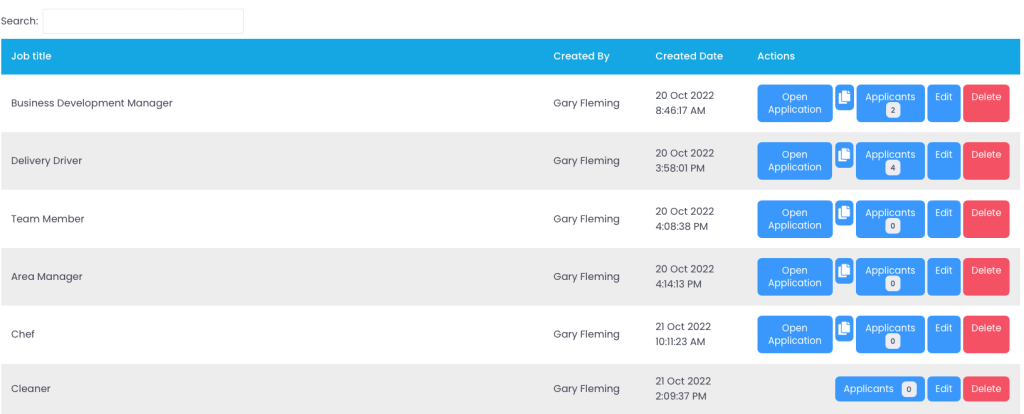
Applicant and stage tracking
Leverage the applicant and stage tracker feature in the Evalu-8 HR recruitment system to gain real-time insights into the status of each candidate for a specific job posting. This enables businesses to efficiently monitor the interview process and pinpoint potential bottlenecks ensuring a smooth, effective recruitment experience.
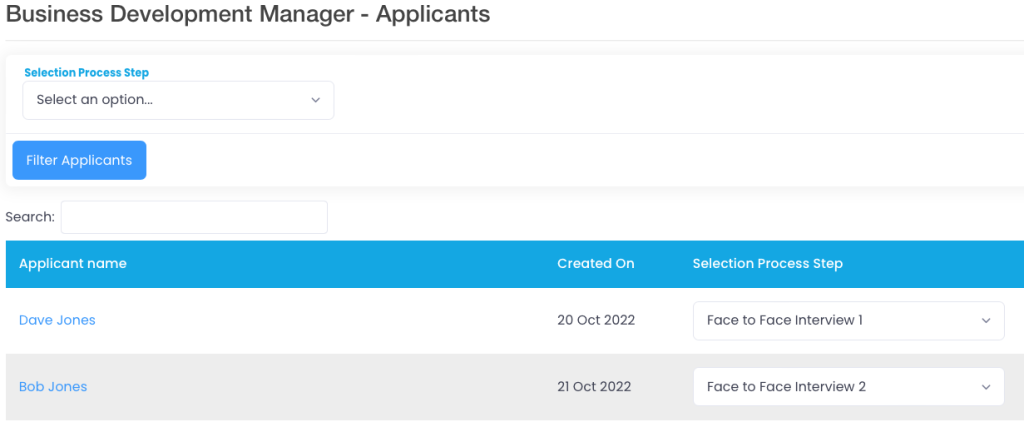
Quickly review application answers, CV and cover letters.
Utilise the review application feature in the Evalu-8 HR recruitment system to effortlessly access and assess applicant responses, CVs, and cover letters in one centralised location.
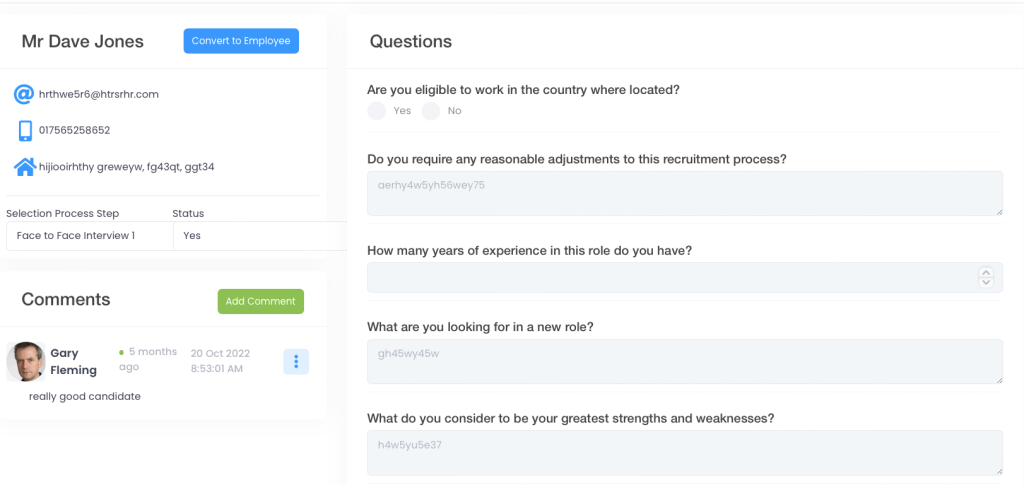
Create screening questions and a full job posting and application process in 10 minutes.
Leverage the job posting builder feature in Evalu-8 HR’s recruitment system to swiftly create tailored screening questions and design a comprehensive job posting and application process in just 10 minutes.
